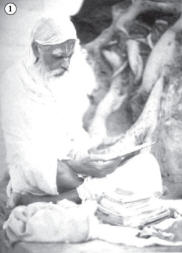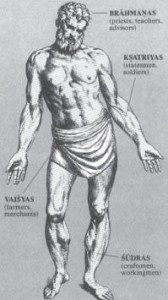A perspective on the old allegation against Hinduism.
Recently my attention was drawn to a political contro versy in South India. A few 'lower caste' men led an agitation. demanding the right to touch the deities and perform worship in a famous Krsna temple. With the local temple priests, belonging to the 'higher', brahmana caste refusing to succumb to the mounting pressure, and the criticism growing, I wondered about the Vedic approach to this religious and social issue.
The Vedic society is often criticized by the modern intelligentsia for its apparently discriminating stand against a certain section of the society. The detractors claim that the Vedas directly support racist and feudal dominance by brandishing a certain group of people as 'sudras'. or low born. India has witnessed social upheavals on this issue, and today caste system has become a sensitive subject with serious ramifications on the national political scene. However the Vedas present a view contrary to the modern zealots' interpretation, and is actually egalitarian in outlook, a point totally ignored by the critics.
BIRTH VS QUALIFICATION

Lord Krsna states in the Bhagavad gita, the most authorized book for the Hindus, that a person's position in the society is based on his qualifications and work, and not on birth (BG 4.13). Thus a person, although born in an apparently higher caste, has to qualify himself. Similarly if a person born into a 'lower' caste displays qualities of a person of the 'higher' order, he shouldn't be discouraged. We cannot assume that children born to doctors are, by virtue of their lineage, qualified to be doctors. Similarly no one can claim to be a brahmana without the necessary training.
The Candogya Upanisad illustrates this point with the story of Satyakama, a young boy who approached a spiritual master for enlightenment. On being questioned about his parentage, the boy replied that he was unsure of his father's identity. He was then told to go and ask his mother. He soon returned and confessed that his mother had known many men, and is herself unsure about who the father was. The spiritual master, being pleased with the boy's honesty, declared, "You are a real brahmana".
NEED FOR SOCIAL DIVISIONS

However a question arises on the need to have such a system in the first place, because this categorization threatens to marginalize certa in groups. Moreover, it is argued, a classless society frees us from these artificial barriers, and promises equal opportunity to all.
The Vedas declare that this kind of division naturally exists in society. In a healthy body has the brain, arms, belly and legs work in harmony. Similarly the symptom of a healthy social body is the peaceful coexistence of teachers and intelligentsia, the administrators, the business class and the labourers. The brahmanas in Vedic society refers to the 'brain' of society, i.e. they provide the intellectual capital and spiritual and moral direction. The ksatriyas, or the administrators are compared to the arms and they play a crucial role of protecring the citizens. The vaisyas, or business class are compared to the belly, and the worker class or slidras are the legs which support the other three orders. This division is natural in any society as different people adopt different occupations based on interest and inclinations. To say the arms are needed but the legs are unimportant for the body is foolish. Likewise to condemn a certain occupational class within the same society is disastrous. Needless to say all the orders have to work with dignity of labor, mutual respect and in harmony with each other.
CAUSE OF MODERN PROBLEMS

The problems in the Vedic society arose primarily due to getting the basics wrong and rampant exploitation taking place on the basis of one's birth in a particular caste. In a human body, although all parts are important, the brain is undoubtedly most vital. Without the brain's working, a physically perfect body is considered unproductive. Similarly for the society to run smoothly, the brahmana class has to be of impeccable character and integrity. When this class becomes corrupted, influenced by false pride and arrogance, the social chaos ensues. Sadly today in India there are many smarta-brahmanas , or caste-conscious brahmanas who insist that one cannot be elevated to brahminical status unless he is born in a brahmana family. This brahmana by-birth conception is non-Vedic, and has justifiably agitated the other sections. Little surprise then that the politicization of this issue and the resultant violence is eroding the social fabric.
THE SOLUTION- RISING 'ABOVE' THE CASTE SYSTEM

Lord Krsna reveals in the Bhagavad gita, the identity of each person as distinctly different from the body (BG 2.13). Presently the 'soul' or the real 'I' is covered by this body and identifying with this perishable body, we claim to belong to a particular caste, nationality, race and so on. Although this occupational division helps one to progress gradually by encouraging us to dovetail our propensities, Krsna extols the intelligent to transcend these temporary designations. He declares the highest religion is loving devotional service to God, and when we engage in our activities with a desire to serve and please Him, we immediately go beyond these petty classifications. When the citizens are trained to be God conscious, they perform their duty in a purified consciousness and considers themselves as servants of others in the society. Thus the Srimad Bhagavatam declares
atah pumbhir dvija-srestha varnasrama-vibhagasah svanusthitasya dharmasya samsiddhir hari-tosanam
"0 best among the twice born, it is therefore concluded that the highest perfection one can achieve by discharging the duties prescribed for one's own occupation according to caste divisions and orders of life is to please the Pe rsonality of Godhead." (SB – 1.2.l3)
The Vedas thus declare that the perfection of this institutional framework is to cooperate jointly for the satisfaction of the Supreme Lord. Srila Prabhupada reveals in his writings , " .. .. . This system exists not for artificial domination of one division over another. When the aim of life, i.e., realization of the Absolute Truth, is missed by too much attachment for sense gratification, this institution is utilized by selfish men to pose an artificial predominance over the weaker section. In the Kali yuga, or the age of quarrel, this artificial predominance is already current, but the saner section of the people knows it well that the divisions of castes and orders of life are meant for smooth social intercourse and high thinking self realization and not for any other purpose . . . ". S rila Prabhupada personally demonstrated this principle through his world wide preaching of Krsna consciousness.
A GLOBAL REVOLUTION SINCE 1966

Five hundred years ago Lord Sri Caitanya Mahaprabhu preached the dharma of Kali yuga, namely chanting of the holy names of God. Widely distributing this message, He induced all to take shelter of Krsna, irrespective of caste and religious barriers. Some of his closest associates were not even Hindus, yet by their unflinching faith in Krsna they proved to be more glorious than the ritualistic priests and brahmanas. Following this tradition, Srila Prabhupada also preached this message of Krsna consciousness in the Western countries. Starting from New York in 1966, he created a revolution by initiating Americans, Europeans and Africans as Vaisnava brahmanas and sannyasis. For all the criticism by the orthodox Hindus, it is these apparently 'low born' who have contributed to spreading the Vedic culture all over the world. Ironically the narrow minded champions of Hindu dharma on the other hand have done little to glorify the supreme Lord and His Holy Names. Of course Srila Prabhupada clarified that this awarding of brahmana and sannyasa to individuals should not to be done indiscriminately but rather by careful examination and training in the highest standards of purity and God centered principles. A controversy of the nature witnessed in the South Indian town is unlikely in a modern ISKCON temple for there is an open invitation to all for practicing the highest religion, namely love of God that is beyond all caste and prejudicial considerations.
Vraja Bihari Dasa, MBA, serves fulltime at ISKCON Mumbai, and teaches Krsna consciousness to students in various colleges.
